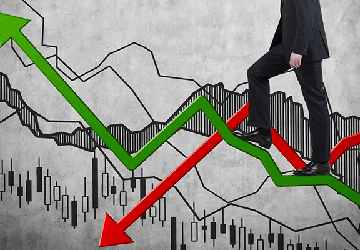What Is Market Volatility and How Does It Impact Your Investments?
"Volatility is a statistical measure of the dispersion of returns on a particular security or market index. In most cases, the higher the volatility, the greater the security risk. Volatility is typically measured by the standard deviation or difference between returns on the same security or market index measured by the variance."
What is market volatility?
As Investopedia describes:
"Volatility is a statistical measure of the dispersion of returns on a particular security or market index. In most cases, the higher the volatility, the greater the security risk. Volatility is typically measured by the standard deviation or difference between returns on the same security or market index measured by the variance."

Put, volatility means how much an asset's higher and lower prices deviate from the mean.
There are many types of fluctuations; read more about them here.
Factors Affecting Market Fluctuations:
Sometimes, multiple factors affect the market; let's look at a few.
1. Economic indicators
Some economic indicators, such as GDP, inflation data, and employment reports, can influence and represent market movements. A company's performance and its tax authorities can significantly affect a product or company's share price.
A state's total revenue at any given time affects this; this could also change and impact share prices if political stability is threatened.
2. Company turnover
For example, if a company experiences a downturn and falls into a recession, it can significantly impact its stock price. A company's attitude in trouble also determines the value of its stock. How it deals with current issues also affects volatility.
How much profit a company makes each fiscal quarter determines its stock price and customer buying interest.
3. Global events and emergencies
Global events such as natural disasters, political wars, and geoeconomic events can have long-term effects on stock markets. Emergencies such as natural disasters can change investor interest in a company's stock. Example: The impact of COVID-19 on the real estate market, particularly the commercial real estate market. There are different ways to deal with this problem. You protect your stock's market value by diversifying your company's motto and products. Put your eggs in another basket.
All these factors will affect market volatility and customer investment sentiment.
Learn More About Market Volatility:
Let’s look at some other factors that influence market volatility.
1. Risk and reward
Generally speaking, when volatility is high, risk is high. Simply put, buyers have to show more confidence when investing, which leads them to demand higher return value as compensation. Volatility is the most critical factor among available pricing options.
2. Diversify your investment portfolio
Portfolio diversification is one of the most common ways to deal with volatility. You never know when your selection of a particular product may change, and portfolio diversity can help you better navigate volatile markets.
The market is usually less volatile than you think. Prices are stable, but risks are always present. You can control investor behaviour by diversifying your portfolio considerably.
3. Trading strategy
Some traders are very smart and always try to take advantage of volatility's short emotional lifespan. This article explains various strategies for trend following, momentum trading, and options trading that can help manage market volatility during difficult times.
You can benefit from it.
4. Long-term investment
You may not have a product that would benefit from momentum trading diversification, and your interests may only be suitable for long-term investing. Investing is almost always a long-term game. Stock trading requires effort. Remember that the stock market may not be for you if you can't tolerate volatility and risk.
Cope With Market Fluctuations:
It is just a continuation of the previous paragraph.
1. This is an opportunity
Volatility is an inherent characteristic of the stock market, so if you decide to invest in it, you should plan accordingly. No matter your path, there are ways to boost your energy.
It will help if you start viewing volatility as an opportunity. At this point, you can start buying stocks yourself; this gives you enough time to take action and formulate your game plan for the next quarter.

You may have planned to invest somewhere, and this opportunity came at the right time. You can now buy more shares within the same budget at a discount, which can serve as a reserve for future emergencies.
However, make sure you do your research before investing. There is no wrong time to be an opportunist.
2. Emergency Fund
Investors must have enough funds to cover 3 to 6 months of lost living expenses.
You're doing a great job if you're not on the verge of having to sell access to get through this tumultuous time. Your savings will take a severe hit. It would help if you had a safety net in this situation. Your customers will use it to gain trust in you.
“As long as you don’t have to cut anything out of your portfolio, it’s all good,” says Vogue’s Benjamin Offit.
Conclusion
Market volatility can have a lasting impact on your market strategy. Consider this when making important decisions about your investment goals for the year.
We've compiled some essential and oft-cited advice for you, listed above. Please check to make sure you are prepared so that your assets are not affected.





